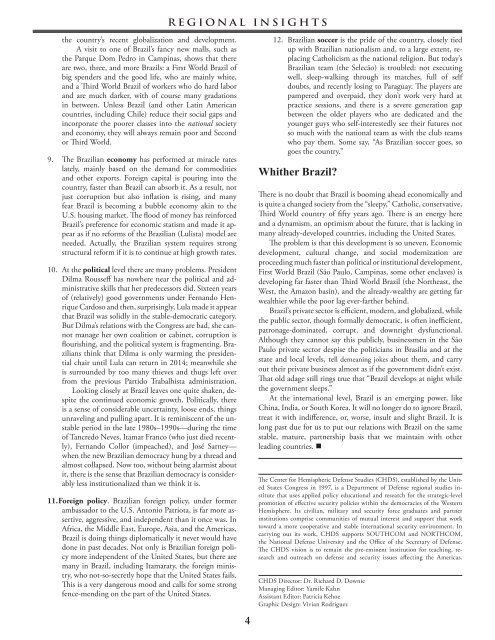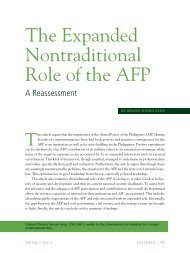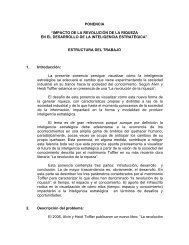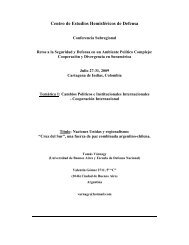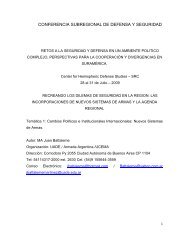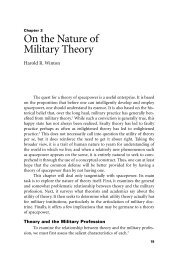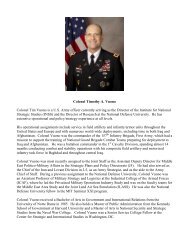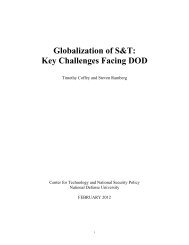Regional Insights - National Defense University
Regional Insights - National Defense University
Regional Insights - National Defense University
You also want an ePaper? Increase the reach of your titles
YUMPU automatically turns print PDFs into web optimized ePapers that Google loves.
the country’s recent globalization and development.<br />
A visit to one of Brazil’s fancy new malls, such as<br />
the Parque Dom Pedro in Campinas, shows that there<br />
are two, three, and more Brazils: a First World Brazil of<br />
big spenders and the good life, who are mainly white,<br />
and a Third World Brazil of workers who do hard labor<br />
and are much darker, with of course many gradations<br />
in between. Unless Brazil (and other Latin American<br />
countries, including Chile) reduce their social gaps and<br />
incorporate the poorer classes into the national society<br />
and economy, they will always remain poor and Second<br />
or Third World.<br />
9. The Brazilian economy has performed at miracle rates<br />
lately, mainly based on the demand for commodities<br />
and other exports. Foreign capital is pouring into the<br />
country, faster than Brazil can absorb it. As a result, not<br />
just corruption but also inflation is rising, and many<br />
fear Brazil is becoming a bubble economy akin to the<br />
U.S. housing market. The flood of money has reinforced<br />
Brazil’s preference for economic statism and made it appear<br />
as if no reforms of the Brazilian (Lulista) model are<br />
needed. Actually, the Brazilian system requires strong<br />
structural reform if it is to continue at high growth rates.<br />
10. At the political level there are many problems. President<br />
Dilma Rousseff has nowhere near the political and administrative<br />
skills that her predecessors did. Sixteen years<br />
of (relatively) good governments under Fernando Henrique<br />
Cardoso and then, surprisingly, Lula made it appear<br />
that Brazil was solidly in the stable-democratic category.<br />
But Dilma’s relations with the Congress are bad, she cannot<br />
manage her own coalition or cabinet, corruption is<br />
flourishing, and the political system is fragmenting. Brazilians<br />
think that Dilma is only warming the presidential<br />
chair until Lula can return in 2014; meanwhile she<br />
is surrounded by too many thieves and thugs left over<br />
from the previous Partido Trabalhista administration.<br />
Looking closely at Brazil leaves one quite shaken, despite<br />
the continued economic growth. Politically, there<br />
is a sense of considerable uncertainty, loose ends, things<br />
unraveling and pulling apart. It is reminiscent of the unstable<br />
period in the late 1980s–1990s—during the time<br />
of Tancredo Neves, Itamar Franco (who just died recently),<br />
Fernando Collor (impeached), and José Sarney—<br />
when the new Brazilian democracy hung by a thread and<br />
almost collapsed. Now too, without being alarmist about<br />
it, there is the sense that Brazilian democracy is considerably<br />
less institutionalized than we think it is.<br />
11. Foreign policy. Brazilian foreign policy, under former<br />
ambassador to the U.S. Antonio Patriota, is far more assertive,<br />
aggressive, and independent than it once was. In<br />
Africa, the Middle East, Europe, Asia, and the Americas,<br />
Brazil is doing things diplomatically it never would have<br />
done in past decades. Not only is Brazilian foreign policy<br />
more independent of the United States, but there are<br />
many in Brazil, including Itamaraty, the foreign ministry,<br />
who not-so-secretly hope that the United States fails.<br />
This is a very dangerous mood and calls for some strong<br />
fence-mending on the part of the United States.<br />
REGIONAL INSIGHTS<br />
4<br />
12. Brazilian soccer is the pride of the country, closely tied<br />
up with Brazilian nationalism and, to a large extent, replacing<br />
Catholicism as the national religion. But today’s<br />
Brazilian team (the Selecão) is troubled: not executing<br />
well, sleep-walking through its matches, full of self<br />
doubts, and recently losing to Paraguay. The players are<br />
pampered and overpaid, they don’t work very hard at<br />
practice sessions, and there is a severe generation gap<br />
between the older players who are dedicated and the<br />
younger guys who self-interestedly see their futures not<br />
so much with the national team as with the club teams<br />
who pay them. Some say, “As Brazilian soccer goes, so<br />
goes the country.”<br />
Whither Brazil?<br />
There is no doubt that Brazil is booming ahead economically and<br />
is quite a changed society from the “sleepy,” Catholic, conservative,<br />
Third World country of fifty years ago. There is an energy here<br />
and a dynamism, an optimism about the future, that is lacking in<br />
many already-developed countries, including the United States.<br />
The problem is that this development is so uneven. Economic<br />
development, cultural change, and social modernization are<br />
proceeding much faster than political or institutional development,<br />
First World Brazil (São Paulo, Campinas, some other enclaves) is<br />
developing far faster than Third World Brazil (the Northeast, the<br />
West, the Amazon basin), and the already-wealthy are getting far<br />
wealthier while the poor lag ever-farther behind.<br />
Brazil’s private sector is efficient, modern, and globalized, while<br />
the public sector, though formally democratic, is often inefficient,<br />
patronage-dominated, corrupt, and downright dysfunctional.<br />
Although they cannot say this publicly, businessmen in the São<br />
Paulo private sector despise the politicians in Brasilia and at the<br />
state and local levels, tell demeaning jokes about them, and carry<br />
out their private business almost as if the government didn’t exist.<br />
That old adage still rings true that “Brazil develops at night while<br />
the government sleeps.”<br />
At the international level, Brazil is an emerging power, like<br />
China, India, or South Korea. It will no longer do to ignore Brazil,<br />
treat it with indifference, or, worse, insult and slight Brazil. It is<br />
long past due for us to put our relations with Brazil on the same<br />
stable, mature, partnership basis that we maintain with other<br />
leading countries. n<br />
The Center for Hemispheric <strong>Defense</strong> Studies (CHDS), established by the United<br />
States Congress in 1997, is a Department of <strong>Defense</strong> regional studies institute<br />
that uses applied policy educational and research for the strategic-level<br />
promotion of effective security policies within the democracies of the Western<br />
Hemisphere. Its civilian, military and security force graduates and partner<br />
institutions comprise communities of mutual interest and support that work<br />
toward a more cooperative and stable international security environment. In<br />
carrying out its work, CHDS supports SOUTHCOM and NORTHCOM,<br />
the <strong>National</strong> <strong>Defense</strong> <strong>University</strong> and the Office of the Secretary of <strong>Defense</strong>.<br />
The CHDS vision is to remain the pre-eminent institution for teaching, research<br />
and outreach on defense and security issues affecting the Americas.<br />
CHDS Director: Dr. Richard D. Downie<br />
Managing Editor: Yamile Kahn<br />
Assistant Editor: Patricia Kehoe<br />
Graphic Design: Vivian Rodriguez


